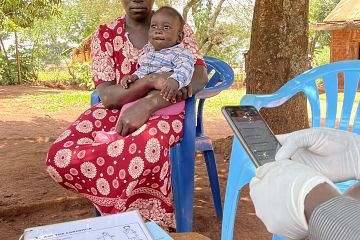Digital solutions driving equitable access to health
6 December 2023
At the Global Digital Health Forum 2023, under the theme ‘Driving effective and equitable digital health innovation’, a panel discussion brought together stakeholders from across the health system spectrum in Uganda to discuss how a digital community health information system has transformed the delivery of essential, community-based health services for children.
Common childhood illnesses — including malaria, pneumonia and diarrhoea — are preventable and manageable if identified early. In some low-income countries, including Uganda, community health workers are crucial in helping to connect communities to quality healthcare that is inclusive and affordable. Using digital systems can further enhance access to health services and support effective, data-informed decision-making.
“Connecting stakeholders from every level of the health system is critical to understanding the ways in which digitalisation can transform community health services, enhance quality service provision and facilitate real-time health data collection and surveillance. This open discussion between policymakers sitting within the Ministry of Health, implementors and end-users of digital solutions at the community level facilitates honest reflections on the process of digitalisation, lessons learned and challenges which can inform and support the effectiveness of future community health digitalisation initiatives.” commented Liberty Bunce, Malaria Consortium’s Senior Digital Health Specialist and panel moderator.
Since 2020, in collaboration with the Ugandan Ministry of Health, Malaria Consortium has worked to develop and implement the Electronic Community Health Information System (eCHIS), which equips community health workers (known locally in Uganda as Village Health Teams or VHTs) with a digital tool developed to enhance quality service provision and real-time surveillance for community health. eCHIS is led and fully owned by the Uganda Ministry of Health and is the only community mobile health tool endorsed for use in the country.
Kiggo Livingstone is a VHT member from Buikwe district. He commented on working in community health with registration books before the introduction of digital tools: “Papers had a challenge. They could get lost, maybe fire, rodents…so you end up losing information”. He added, “You are not guaranteed of the security when the book is taken, because someone can go in the book and get sensitive information. Matters dealing with HIV and what have you, they start exposing people. But with the phone you have your password. You put it there. You are the only person who knows, so the safety of the people is guaranteed”.
Malaria Consortium assessed the acceptability, feasibility and usability of the eCHIS digital tool among CHWs. The results from digitalising the CHW programme were presented at the forum, highlighting improvements in accuracy of malaria and pneumonia assessments from 70 to 78 percent. Other presentations explored the use of a digital tool for implementing a long-lasting insecticidal net distribution campaign for malaria prevention in South Sudan, and lessons from implementing a digitalised insecticide-treated net campaign in Ananmbra state, Nigeria.
Digital tools can enhance the ability of health systems to develop adaptive, responsive surveillance and information systems alongside strengthening community involvement and ownership. Collectively, these activities are contributing to resilient health systems that enhance accountability and are responsive to the needs of the community. This is additionally supporting the development of efficient, effective, inclusive funds and processes that offer value for money in the delivery of health services.
All presentations made by Malaria Consortium at the 2023 Global Digital Health Forum are available for download on our publications database
If you would like to know more about Malaria Consortium’s digital health work, please email [email protected]
Related content
6 December 2023
Implementation of an Electronic Community Health Information System and research lessons
5 December 2023Implementation of a mass insecticide-treated net campaign using information and communication technology for development through a single-phase distribution approach in Anambra state, Nigeria
5 December 2023Evaluating the acceptability and usability of digital tools for implementing a long-lasting insecticidal net distribution campaign in Northern Bahr el Ghazal state, South Sudan
5 December 2023Assessing the acceptability and feasibility of digitalising the community health worker programme in Uganda
Digital Health Capacity Statement
Latest news
- Malaria Consortium honoured by Ugandan government for contribution to combat malaria23rd April 2024
- International summit calls for AMR accountability in public health interventions21st March 2024
- Global SMC community celebrates new milestone at SMC Alliance Annual Meeting in Nigeria6th March 2024
- Scaling up key interventions could halve pneumonia-related childhood mortality13th February 2024
- Malaria Consortium and eGov Foundation join Mozambique’s national malaria programme to digitalise seasonal malaria chemoprevention campaigns8th February 2024
- World’s first malaria vaccine rollout launched in Cameroon22nd January 2024